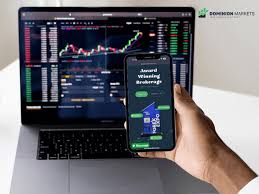
Global Forex Trading: The Modern Financial Revolution
In the ever-evolving financial landscape, global forex trading Crypto Trading App has emerged as an innovative tool that simplifies trading processes and connects traders globally. Forex trading, or foreign exchange trading, has also witnessed tremendous advancements, becoming one of the most active and liquid markets in the world. Understanding global forex trading is essential for anyone looking to participate in this dynamic market.
What is Forex Trading?
Forex trading involves exchanging one currency for another, intending to profit from fluctuations in currency values. Unlike stock markets, the forex market operates 24 hours a day, five days a week, allowing traders from various time zones to participate. The primary purpose of forex trading is to generate profit by predicting currency movements relative to other currencies.
The Structure of the Forex Market
The forex market is decentralized, meaning that it does not have a centralized exchange or physical location. Instead, trading occurs through a network of banks, financial institutions, corporations, and individual traders globally. The market consists of several key players:
- Central Banks: They play a critical role in influencing currency values through monetary policy and interest rates.
- Commercial Banks: Major banks act as intermediaries for currency transactions and are heavily involved in trading activities.
- Brokers: Forex brokers provide platforms for traders to execute trades and often facilitate access to the market.
- Retail Traders: Individual investors who trade forex through online platforms and brokerages.
The Trading Process

Forex trading begins with the trader selecting a currency pair to trade. A currency pair consists of two currencies, where the first is the base currency and the second is the quote currency. For example, in the pair EUR/USD, the Euro is the base currency, while the US Dollar is the quote currency. Traders speculate whether the value of the base currency will rise or fall against the quote currency, which determines their trading strategy.
Types of Orders
In forex trading, different types of orders are used to execute trades:
- Market Orders: These orders are executed at the current market price.
- Limit Orders: These orders allow traders to set specific price levels for buying or selling currencies.
- Stop-Loss Orders: These orders help traders limit potential losses by closing a position once a currency reaches a specified price.
Important Factors Affecting Forex Prices
Several factors influence currency prices in the forex market, including:
- Economic Indicators: Reports on employment figures, GDP, inflation, and trade balances can significantly impact currency values.
- Political Stability: Countries with stable governments tend to have stronger currencies, while political upheaval can lead to volatility.
- Interest Rates: High interest rates offer lenders in an economy a higher return relative to other countries, often attracting foreign capital and causing currency appreciation.
- Market Sentiment: Traders’ perceptions and attitudes can lead to price movements, sometimes driven by news events or economic forecasts.
Advantages of Forex Trading
Forex trading offers several advantages for traders, including:

- High Liquidity: With a daily trading volume exceeding $6 trillion, traders can enter and exit positions quickly.
- 24/5 Trading: The forex market is open 24 hours, allowing flexibility for traders in various time zones.
- Leverage: Many brokers offer leverage, enabling traders to control larger positions with a smaller initial investment.
- Accessibility: The forex market is accessible to anyone with an internet connection, providing opportunities for retail traders.
Challenges in Forex Trading
Despite its advantages, forex trading also involves challenges:
- Risk of Loss: The potential for significant losses exists, especially when using leverage.
- Complex Market Dynamics: Understanding the vast array of economic indicators and geopolitical events can be daunting.
- Broker Reliability: Selecting a trustworthy broker is crucial, as some may engage in unethical practices.
Tools and Strategies for Success
To navigate the forex market effectively, traders can utilize various tools and strategies:
- Trading Platforms: Software platforms allow traders to analyze markets, execute trades, and manage their accounts.
- Technical Analysis: This involves analyzing historical price data and patterns to forecast future price movements.
- Fundamental Analysis: Traders assess economic news and data to make informed purchase or sale decisions.
- Automated Trading Systems: Algorithms that execute trades based on pre-defined criteria can remove human emotion from trading decisions.
Conclusion
Global forex trading presents both opportunities and challenges for traders. As the market continues to grow and evolve, staying informed about market trends, economic indicators, and effective trading strategies is essential for success. With advancements in technology and the advent of mobile trading applications, such as the innovative Crypto Trading App, entering the forex market has never been easier. However, aspiring traders must approach the market with caution, ensuring they are well-equipped to navigate this complex financial landscape.